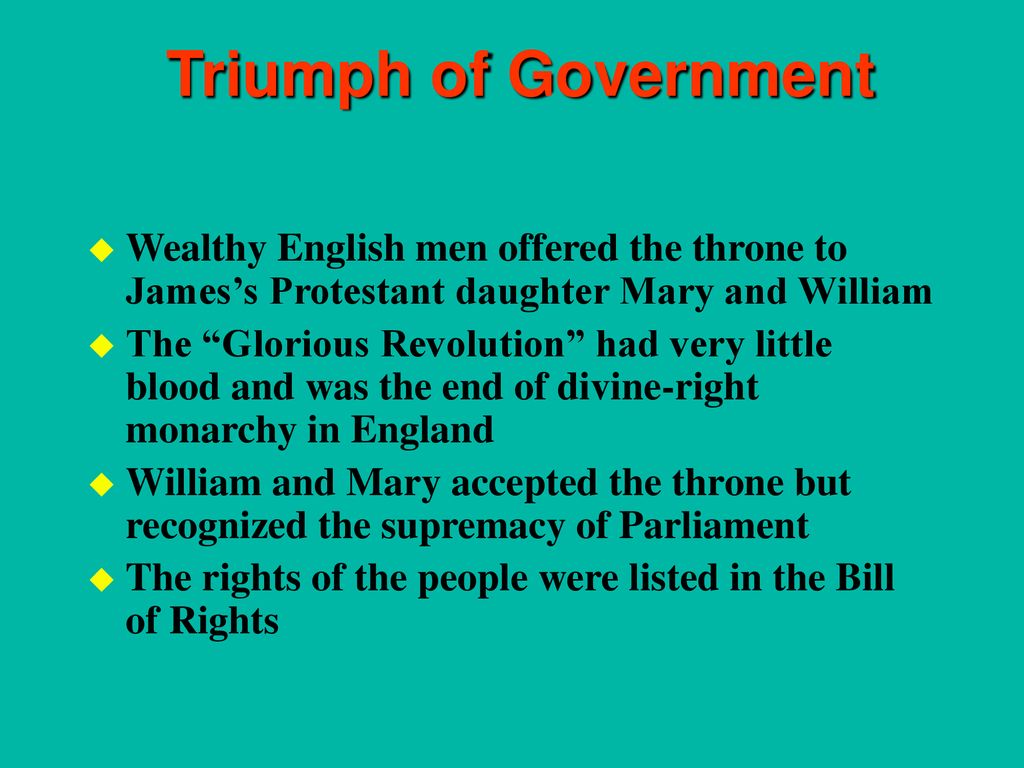At the height of their rule in the early 1650s some Puritans had attempted to enforce on the whole population the austere life of the Puritan ideal. This enforcement took the form of “blue laws”: prohibitions on horse racing, gambling, cock fighting, bear baiting, dancing on the greens, fancy dress, the theater, and a host of ordinary pleasures of daily living. Yet this attempt to legislate morality, coming too early for modern techniques of propaganda and regimentation, was not entirely effective.
Many an Anglican clergyman, though officially “plundered”—that is, deprived of his living—continued worship in private houses, and many a cock fight went on in secluded spots. Nevertheless, the strict code was there, with earnest persons to try to enforce it and with implacable enemies to oppose it. The remark of the great Victorian historian T. B. Macaulay (1800-1859)—that the Puritans prohibited bear baiting not because it gave pain to the bear but because it gave pleasure to the spectators—showed the deep hostility that survived in England toward the reign of the Puritan “saints” two centuries later.
Despite this negative judgment, the events of 1640-1660 are of major importance in the history of the West. For the first time a monarch was challenged in a major revolt by politically active private citizens. Though the Stuarts were ultimately restored, no English king could ever hope to rule again without a Parliament, or revive the court of Star Chamber, or take ship money, benevolences, and other controversial taxes. Parliament thereafter retained that critical weapon of the legislative body in a limited monarchy, control of the public purse by periodic grants of taxes.
Another basic freedom owes much to this English experience. Freedom of speech was a fundamental tenet of the Puritans, even though at the height of their power they did not observe it themselves. It received its classic expression in 1644 by the poet John Milton (1608-1674), in his Areopagitica. While Milton defended free speech principally for an intellectual and moral elite, one of his arguments was characteristically pragmatic and English, namely, that attempts to curb free expression just would not work.
The voluminous pamphlet literature of the early years of the great turmoil was a lively manifestation of free speech in action. The extraordinary rise of radical minorities foreshadowed modern political and social thought. One such group, the Levelers, found many sympathizers in the revolutionary army and advanced a program later carried by emigrants to the American colonies. They called for political democracy, universal suffrage, regularly summoned parliaments, progressive taxation, separation of church and state, and the protection of the individual against arbitrary arrest.
There were even hints of economic equality, a goal then closely tied to biblical ideas. The Diggers, for example, were a small sect that preached the sharing of earthly goods in a kind of communism. They advocated plowing up common and waste land throughout England, regardless of ownership, in the interests of social reform. The Ranters attacked “respectable” beliefs, arguing that sin hardly existed, that a reformation in behavior would free the oppressed from the nobility and gentry. Fifth Monarchy advocates, Millenarians, and a dozen other radical sects preached the Second Coming of Christ and the achievement of a utopia on earth.
Still more important, there emerged from the English Revolution, even more clearly than from the religious wars on the Continent, the concept of religious toleration. The Independents, while they were in opposition, stood firmly for the right of religious groups to worship God as they wished. Though in their brief tenure of power they showed a readiness to persecute, they were never firmly enough in the saddle to make England into a seventeenth-century version of Calvin’s Geneva.
At least one sect, the Quakers, led by George Fox (1624-1691), held to the idea and practice of religious toleration as a positive good. The Quakers denounced all worldly show, finding even buttons ostentatious. They found the names of the days and months indecently pagan, the polite form “you” in the singular a piece of social hypocrisy, and the taking of legal oaths impious. Hence they met for worship on what they called the First Day rather than the day of the sun god; they addressed each other as “thee” or “thou”; and they took so seriously the Protestant doctrine of the priesthood of the believer that they eliminated any formal ministry.
In the Religious Society of Friends, as they were properly known, any worshiper who felt the spirit move might testify—give what other sects would call a sermon. The Friends felt too deeply the impossibility of forcing anyone to see the “inner light” for them to force people to accept their faith. They would abstain entirely from force, particularly from war, and would go their own way in Christian peace.
Among the Quakers the religious rights of women reached new heights. Any Friend could speak and prophesy; Fox declared that the subjection of women, which had been decreed at the fall of man in the garden of Eden, was ended through the sacrifice made by the Redeemer. Women were priests, and Christ was both male and female. Thus women played a major role in Quakerism and, from 1671, held women’s meetings, which gave them a share in church government.
The Civil War sects also gave women important, if not equal, roles to play, challenging orthodox arguments for the exclusion of women from church office. The sects focused often on the family and its ethical and moral role; combined with the spread of religious toleration, this led to some weakening of the idea of paternal authority, with spheres being defined in which maternal authority was to govern.

